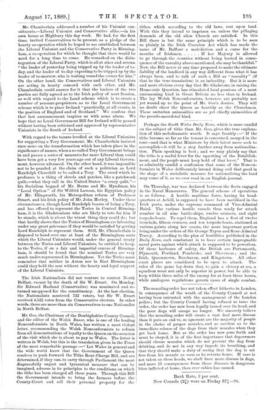Mr. Gee, the Chairman of the Denbighshire County Council, and
the editor of the Welsh Baner, who is one of the leading Nonconformists in North Wales, has written a most violent letter, recommending the Welsh Nonconformists to refrain from all demonstrations of loyalty to the Queen on the occasion of the visit which she is about to pay to Wales. The letter is written in Welsh, but this is the translation given in the Times of the most remarkable passage :—" Let Wales in general and the wide world know that the Government of the Queen resolves to push forward the Tithe Rent-Charge Bill, and are determined, if they can, to carry through Parliament the most disgracefully unjust and tyrannical measure that can be imagined, adverse in its principles to the conditions on which the tithe has been charged all these years. Through this Bill the Government intends to bring the farmers before the County-Court and sell their personal property for the
tithes, which according to the old laws, rest upon land. With this they intend to imprison us, unless the pillaging demands of the old alien Church are satisfied. In this Bill there is but the same principle which is to be seen so plainly in the Irish Coercion Act which has made the name of Mr. Balfour a malediction and a curse for the
mouths of Irishmen If her Majesty is allowed to go through the counties without being hooted in conse- quence of the rascality above-mentioned, she may be thankful." Now, the Bill never at any time proposed to make the ultimate liability of the landlord in any way different from what it has always been, and to talk of such a Bill as " rascality" (if that be the true translation) is an imbecility. But it is more and more obvious every day that Mr. Gladstone, in raising the Home-rule Question, has stimulated local passions of a most unreasoning kind in Great Britain no less than in Ireland. The lay Welsh Nonconformists, however, are probably not yet wound up to the point of Mr. Gee's desires. They will no doubt cheer the Queen as heartily as the Churchmen. These sectarian animosities are as yet chiefly animosities of the pseudo-sacerdotal kind.


































 Previous page
Previous page